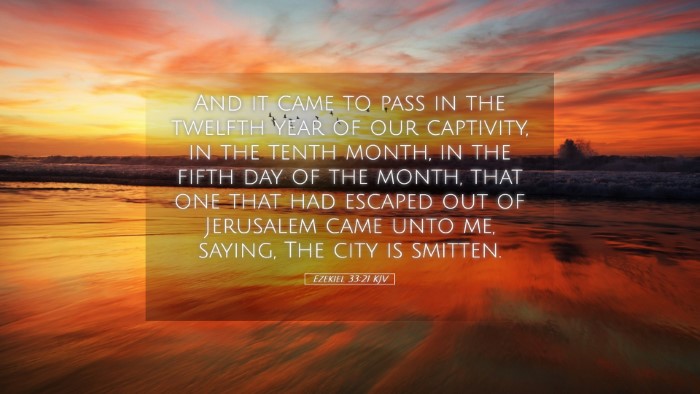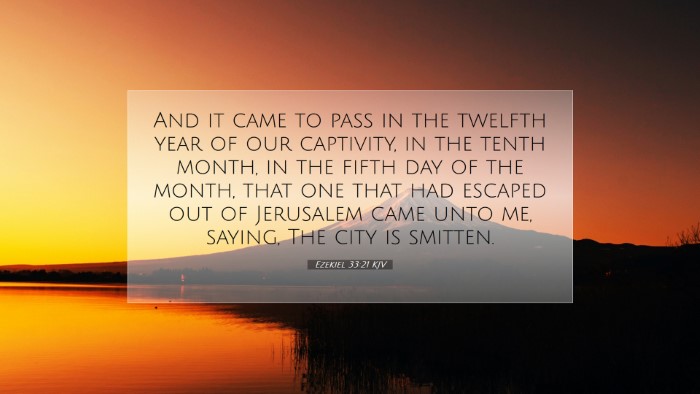Ezekiel 33:21 - Commentary and Insights
Verse: "And it came to pass in the twelfth year of our captivity, in the tenth month, in the fifth day of the month, that one that had escaped out of Jerusalem came unto me, saying, The city is smitten."
Contextual Background
The book of Ezekiel is situated within the prophetic literature of the Old Testament, addressing the Jewish exiles in Babylon. Ezekiel serves as both a prophet and a priest, interpreting God's messages during a time of turmoil and desolation for Israel. By the time we reach chapter 33, the prophet is amidst a pivotal unfolding of events, much of which revolves around the destruction of Jerusalem.
Exegesis and Commentary
Ezekiel 33:21 opens an extraordinary chapter in the narrative of Jewish history—it marks a critical moment when the news of Jerusalem's fall reaches the exilic community. The significance of this news is profound as it not only confirms the prophetic warnings issued by Ezekiel about the consequences of persistent disobedience but also serves as a turning point for the exiles themselves.
Historical Significance
Matthew Henry notes that the date mentioned is crucial. The twelfth year of captivity corresponds to 586 B.C., a year marked by the final siege and destruction of Jerusalem by Babylon. This was a fulfilment of God's prophetic word communicated through various prophets, including Jeremiah and Ezekiel. This prophecy and its realization underscore God's sovereignty and faithfulness to His word.
The Messenger
According to Adam Clarke's commentary, the fact that a survivor from Jerusalem arrives with news indicates the severity of the circumstances. This lone messenger signifies God’s mercy, offering a channel through which information—and by extension, hope—can flow amid despair. The stark reality of the situation becomes palpable for Ezekiel, as it transforms theoretical impending doom into a present reality.
Theological Implications
Albert Barnes expands on the implications of this verse, suggesting that the news serves a dual purpose. First, it is a confirmation of God's judgment and a stark reminder of the consequences of sin. Second, it represents a foundational moment for the restoration and the necessity of repentance among the exiles. The tragic fate of Jerusalem highlights the need for renewal among God's people—a theme prevalent throughout prophetic literature.
Reflection on God’s Judgment and Mercy
As we delve further into the themes of this passage, it is crucial to recognize the balance between God's justice and His mercy. Matthew Henry emphasizes that while God’s judgments are severe, they are also tempered with an opportunity for renewal and repentance. The arrival of the escapee symbolizes the inevitable conclusion of God's long-stretched grace. What remains is the question of response from the exiled community.
Encouragement for Exiles
The message can invoke reflection among contemporary believers as well. Just as the exiles were called to respond correctly to tragedy, modern readers are reminded of the call to spiritual awakening and repentance in light of their circumstances. There lies a challenge to not only acknowledge God's hand in our lives but also to respond in faith and obedience.
Conclusion
The testimony of the escapee in Ezekiel 33:21 serves as a foundational narrative pivot. It compels the reader to grapple with themes of judgment, the consequences of disobedience, and the need for spiritual reawakening. The layers of this passage encourage reflection on how we respond to God's calls and the realities of our circumstances.
In summary, as students, pastors, and theologians study this verse, they are urged to consider not just the historical context, but also how such a narrative echoes in our congregational and personal lives today. Are we awake to the messages God sends? Are we prepared to respond with faithfulness when confronted with our own predicaments?


